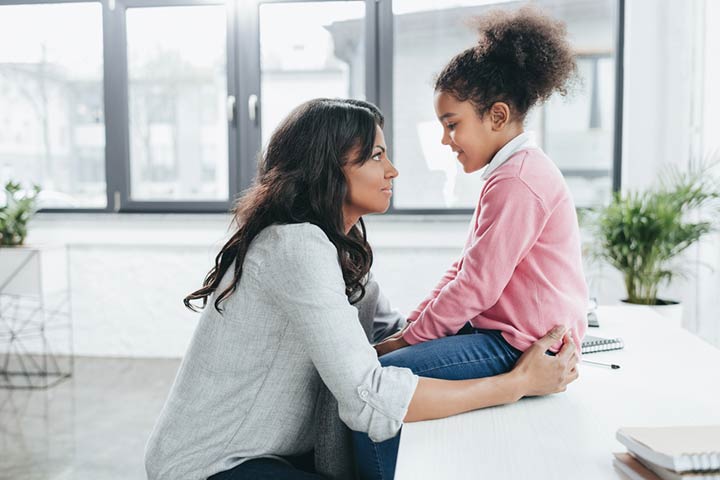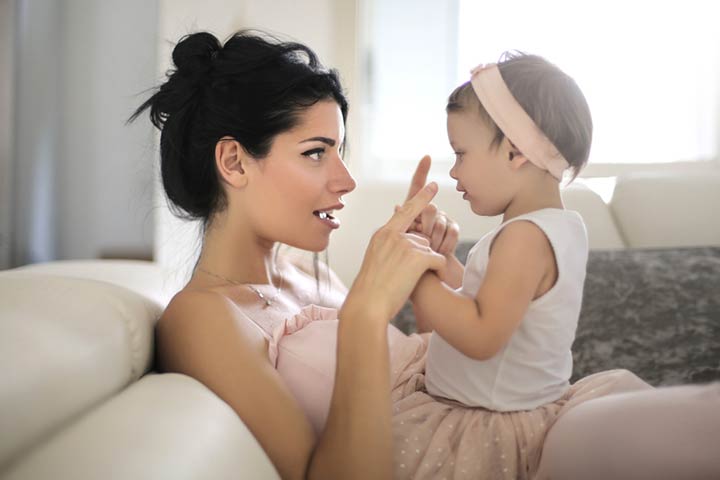
Image: Shutterstock
Every parent wants their kids to be exceptional. No, we don’t mean that you add pressure on your kids to be extraordinary, but you believe they already are. Every parent believes that their child is a genius. When your kid is a baby and puts a toy in a toy box, you cannot help but brag to your friends about what a fast learner they are. It’s in your nature to be proud of your kids, and there are no two ways about it. But you have to understand that they need your guidance to grow and develop. The first few years of your child’s birth are crucial to their development. Apart from physical changes, this is the time when your child’s language and communication skills develop. So here are 5 ways that you can help your child advance their communication:
1. Connect And Show
You kids might not know to speak in proper sentences at the age of one, but they understand your emotions. Infants read your facial expressions and communicate with you through theirs. As they grow older, they may also pay more attention to your body language and tone. Remember that your children are watching you and will follow what you do. Therefore, be aware of the behaviors that you are modeling and set the right example. Watch what you do and how you act because they will be observing you. Make eye contact with them and slow down so your child can pick up on communication cues.
2. Perform And Mirror
Mimicry is everything to a baby. Movements, expressions, and tone of voice teach them what you mean little by little. They pick up more each day until they begin to understand everything that you do and say. Be sure to talk slowly and articulate clearly what you want your baby to understand. They might start saying two-word sentences. “No” is something that your baby picks up pretty quickly. If your child has embodied certain deviant behaviors, it’s probably something they learned by observing you (oops).
3. Talk And Cuddle
Kids always copy adults. As they get older, their actions and reactions are a result of what they see around them. They even start to express their emotions better. If a friend upset them, they might cry, throw a tantrum or be cranky. Their developing vocabulary and sense of understanding pave the way for you to have conversations about concepts that you might think they are not ready for. They might not fully understand, but don’t worry because they will probably be able to piece bits together and make sense of what you say.
4. Emote And Empathize
Your toddlers might understand words like excited, angry, happy, sad, and scared. They might even be able to know what they mean and how these words make them feel. It’s only natural that they start emoting. Your toddlers may even begin to empathize with you or those around them at this point. If you’ve ever experienced your toddler running up to you to hug you and ask you why you’re sad, you know exactly what we’re talking about.
5. Talk And Let Them Learn
Talk, talk and talk. The more you talk to your kids, the faster and better their communication skills become. They learn to pick up words faster, their listening skills improve, and they understand you even when you speak quickly. By the time they are 5, they develop a sense of responsibility and independence, hence increasing your responsibility towards them. Always lead by example and hand out simple tasks for them to do so that they develop their skills better.
As parents, you have to have difficult and uncomfortable conversations with your children when they’ve reached a certain age. Be sure to include topics related to respect, tolerance, diversity, and kindness. Your children’s upbringing is your responsibility, and every parent wants their kid to grow up with a solid moral compass.















